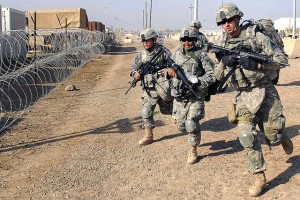Ask people who their heroes are, and many of them talk about those who engage in physical exploits, such as soldiers and athletes. Most of those who I consider to be courageous, however, do not engage in any physical acts of bravery. Many of my heroes are journalists, such as Bill Moyers, Amy Goodman, Glenn Greenwald, John Nichols and Julian Assange. I think of at least two American politicians: Elizabeth Warren Matt Taibbi and Bernie Sanders. I think of comedians who speak truth to power, including George Carlin (now deceased), Jon Stewart and Bill Maher. I think of Daniel Ellsberg.
Salman Rushdie writes that we confuse physical bravery for moral courage:
We find it easier, in these confused times, to admire physical bravery than moral courage – the courage of the life of the mind, or of public figures. A man in a cowboy hat vaults a fence to help Boston bomb victims while others flee the scene: we salute his bravery, as we do that of servicemen returning from the battlefront, or men and women struggling to overcome debilitating illnesses or injuries . . . Even more strangely, we have become suspicious of those who take a stand against the abuses of power or dogma.
I agree. Even among acquaintances who identify themselves as progressive, I’m finding

increasing numbers who are unable or unwilling to understand that some illegal acts are perfectly moral. They are unable to understand that whistle-blowing is sometimes the only way to fight a corrupt or abusive government. Whistle-blowing is honorable, as Steven Rosenfeld explains:
Whistleblowers are not spies or traitors, as the Bush and Obama administration’s lawyers have alleged. They are patriotic and often conservative Americans who work inside the government and with military contractors, and who find unacceptable—and often life-threatening—or illegal behavior goes unheeded when they report it through the traditional chain of command. They worry about doing nothing and feel compelled to go to the press, even if they suspect they may lose their jobs. What they don’t realize is that their lives will never quite be the same again, because they underestimate the years of government persecution that follows. [T]he whistleblower [is] a special kind of American hero—one whose importance is easily forgotten in today’s infotainment-drenched media. Since the Vietnam War in the 1960s, whistleblowers have been part of many history-changing events: questioning the war in Vietnam by releasing the Pentagon Papers on military’s failings; exposing the Watergate burglary that led to President Richard Nixon’s resignation; exposing the illegal nationwide domestic spying program by the George W. Bush administration after 9/11; revealing the military’s failure to replace Humvees in Iraq and Afghanistan with better bomb-deflecting vehicles, leading to hundreds of deaths and maimings . . .
It takes a lot of courage to put one’s income and reputation at risk, especially in modern times, where the general public conflates acts that are illegal with acts that are immoral. And it takes even more courage to blow the whistle early, a point raised by Daniel Ellsberg in 2011:
“I didn’t tell Congress any more than my boss did, so I participated” in the cover-up, he said at the American Library Association’s annual conference in New Orleans.
“Had I given Congress the drawers full of material that I had,” Ellsberg, 80, said, “I think the Vietnam war could not have happened. Fifty-eight thousand American lives would have been saved.
“That’s a heavy burden, and it’s why I’ve been saying for years … to not do what I did. Don’t wait until the war gets started. Don’t wait until we attack Iraq or Syria. Don’t wait until more people die and more bombs have fallen. Show that the public is being misled, that this is where we are going.”

